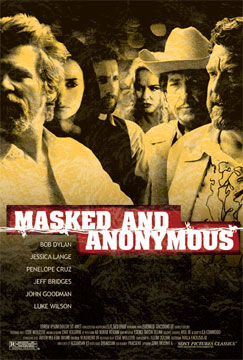Films
An e-mail at work from my wife entitled "short, non-Katrina read" and today's Rigorous Intuition post both point to a couple of favorite recent films.
RI blog author Jeff Wells' post is about Bob Dylan's 2003 film Masked and Anonymous, which was almost universally slammed by corporate media critics. My review, in the form of a IM chat, was at odds with the prevailing sentiment.

An interesting cast o characters
Jeff also points us to a great David Vest piece on the film. The musician, writer and sharp observer of the American scene writes:
Leigh's e-mail provided a link to a Guardian piece about Japanese animated filmmaker Hayao Miyazaki, who makes films of singular artistic integrity -- Howl's Moving Castle, most recently, as well as Oscar winner Spirited Away and the metaphysical epic Princess Mononoke.

Scenes from Howl's Moving Castle and Hayao Miyazaki at the Venice film festival in 2005. Photograph: Claudio Onorati/EPA
The article features a rare interview with the director, including:

If it walks like a castle, it must be a castle. Howl's Moving Castle.
Another fairly recent favorite is The Station Agent.

Hangin out, hangin in.
An e-mail at work from my wife entitled "short, non-Katrina read" and today's Rigorous Intuition post both point to a couple of favorite recent films.
RI blog author Jeff Wells' post is about Bob Dylan's 2003 film Masked and Anonymous, which was almost universally slammed by corporate media critics. My review, in the form of a IM chat, was at odds with the prevailing sentiment.

An interesting cast o characters
Jeff also points us to a great David Vest piece on the film. The musician, writer and sharp observer of the American scene writes:
In spite of what you may have read, the film is not "set in some imaginary third-world country at some point in the future," anymore than King Lear is about prehistoric England. Failure to recognize the true setting should immediately disqualify any reviewer. "Masked and Anonymous" is a spot-on accurate portrayal of what is going on RIGHT NOW, seen through the eyes of someone with vision and not just eyesight, someone who has looked through the eyes not only of Charley Patton and Elizabeth Cotton but also of Emmett Miller and even Daniel Decatur Emmett.
All America's chicken-hawk foreign wars have come home to roost. The horrors once visited upon El Salvador, Nicaragua, Vietnam, Somalia and Iraq are now rolling through the streets of California.
Leigh's e-mail provided a link to a Guardian piece about Japanese animated filmmaker Hayao Miyazaki, who makes films of singular artistic integrity -- Howl's Moving Castle, most recently, as well as Oscar winner Spirited Away and the metaphysical epic Princess Mononoke.

Scenes from Howl's Moving Castle and Hayao Miyazaki at the Venice film festival in 2005. Photograph: Claudio Onorati/EPA
The article features a rare interview with the director, including:
"Personally I am very pessimistic," Miyazaki says. "But when, for instance, one of my staff has a baby you can't help but bless them for a good future. Because I can't tell that child, 'Oh, you shouldn't have come into this life.' And yet I know the world is heading in a bad direction. So with those conflicting thoughts in mind, I think about what kind of films I should be making."
Perhaps this is why he tells children's stories. "Well, yes. I believe that children's souls are the inheritors of historical memory from previous generations. It's just that as they grow older and experience the everyday world that memory sinks lower and lower. I feel I need to make a film that reaches down to that level. If I could do that I would die happy."
I ask if he feels he's managed that already and he chuckles and shakes his head. Nor does he feel that film can be employed as a force for good. "Film doesn't have that kind of power," he says, gloomily. "It only exerts its influence when it stirs patriots up against other nations, or taps into aggressive, violent urges."
This is a black diagnosis indeed. But then, inexplicably, Miyazaki's mood lightens. Perhaps it's the sunshine, or the cigarette, or the fact that the interview is almost over. "Of course," he relents, "if, as artists, we try to tap into that soul level - if we say that life is worth living and the world is worth living in - then something good might come of it." He shrugs. "Maybe that's what these films are doing. They are my way of blessing the child"

If it walks like a castle, it must be a castle. Howl's Moving Castle.
Another fairly recent favorite is The Station Agent.

Hangin out, hangin in.

